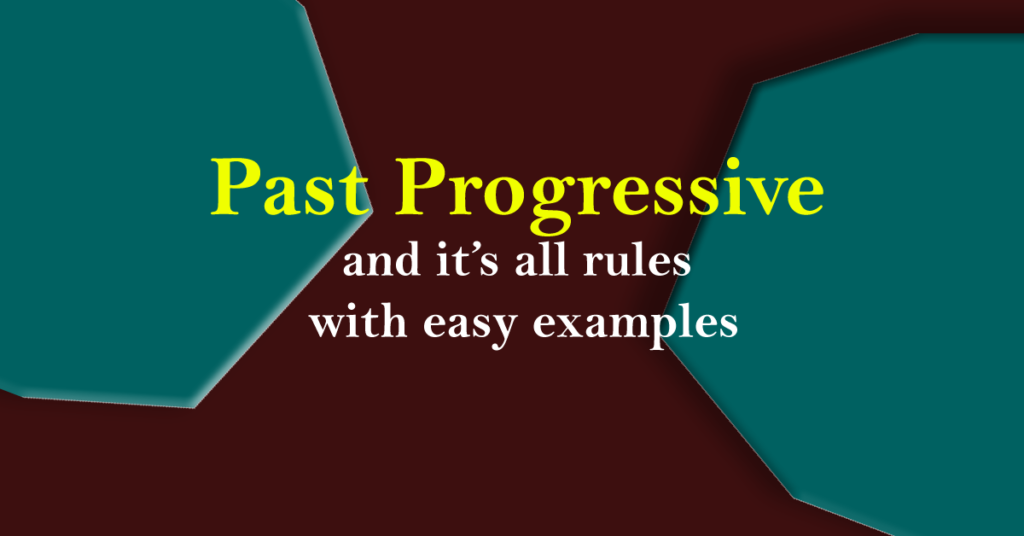What is Past Progressive?
As we have already studied in Step-17 that the Past Progressive is used to talk about the action that was going on (i.e. was in progress) at a particular time in the past, or over a longer time in the past. Like the Present Progressive, the verb in the Past Progressive is in the –ing form and takes was/were before depending on the subject. See the examples.
Affirmative / Negative / Interrogative / Negative & Interrogative Sentence of Past Progressive
| Affirmative | Negative | Interrogative | Negative and Interrogative | |
| Singular | I/He/She/Advaith/It was playing. | I/He/She/Advaith/It was not playing. | Was I/he/she/Advaith/it playing? | Was I/he/she/Advaith/it not playing? or Was not I/he/she/Advaith/it playing? |
| Plural | We/They/You/You were playing. | We/They/You/You were not playing. | Were we/they/you/you playing? | Were we/they/you/you playing? or Were not we/they/you/you playing? |
Note that was is used when the subject is in the first person and the third person singular number. Were is used with all other subjects. Click the link and learn How to add “ing” to the Main Verb?
Rules for Past Progressive/ Continuous Tense
Past Progressive/ Continuous Tense Rule-1
We use the Past Progressive to talk about the action that was going on (i.e. was in progress) at a particular time in the past, or over a longer time in the past. See the examples.
- We were waiting for the bus in the morning.
- Madhumita was having her lunch at 11 am this morning.
- What were you doing last evening?
- It was raining all night yesterday.
- My brother was reading in this college last year.
Note: We use the past simple to talk about a completed action in the past, whereas we use the past progressive to talk about an action in progress in the past.
- Goapla was eating an ice cream at that time. (eating was going on)
- Gopal ate an ice cream. (eating was complete and over)
Note: We do not use the stative verbs in the Past Progressive as in the Present Progressive. See the list of selected verbs that are not used in Progressive Sentence. See the examples.
A. My mother loved me very much. (Correct)
B. My mother was loving me very much. (Incorrect)
Past Progressive/ Continuous Tense Rule-2
If two actions were going on in the past at the same time, we use the Past Progressive for both the actions. See the examples,
- My brother was watching videos on Youtube while I was reading.
- While the teacher was teaching, the students were listening to him.
- The mother was watching the baby while it was playing.
- What were you doing when I was reading?
- I was washing my clothes when my mother was cooking.
Past Progressive/ Continuous Tense Rule-3
The Past Progressive is used for the longer action and Past Simple for the shorter action that took place in the middle of the longer action when both the actions relate to the past. See the examples,
- Sidhant fell down when he was climbing the tree.
- The teacher came in when I was dancing.
- While I was eating, the telephone rang.
- When I was looking at the sky, I saw an aero plane.
Sentences describing both the actions are combined by when, while, as , just ,as, just when as in the above examples.
Past Progressive/ Continuous Tense Rule-3(i)
But remember, if one thing happens after another in a sequence, then we use the Simple past for both the actions. See the following examples.
- The dancer danced when the song played.
- The audience clapped when the speech finished.
- The students stoop up when the teacher came in.
Past Progressive/ Continuous Tense Rule-4
The Past Progressive is used to talk about actions especially, unpleasant ones that took place frequently in the past. We use the adverb always with such actions.
- She was always getting punishment in school.
- My younger sister was always disturbing me at study.
- Deepanshu was always forgetting to do his task.
- My neighbor was always asking for money.
Past Progressive/ Continuous Tense EXERCISE-01
Fill in the blank using Past Simple or Past Progressive forms of the verbs in brackets.
- I _________(watch) the children who _________ (play).
- What _________ you _________ (buy) when you _________ (get) the prize money?
- Geeta_________ (lose) her pen while she _________ (play).
- The house_________ (burn) when he _________ 9rach) the place.
- We all _________ (leave) when he _________ (finish) his speech.
- When the teacher _________ (teach), some children _________ 9llok) out of the window.
- What _________ you _________ (see) when you _________ (reach) there?
- I _________ (watch) the sky when the sun _________ (set).
- My mother _________(cook) when I_________(return) home.
- When I _________ (do) my homework, my sister _________ 9paint) a picture.
- What _________ you _________ (do) when I _________ (telephone) you ?
- I _________ (wash) my clothes at nine this morning.
- I _________ (sleep) when someone _________ (knock) at the door.
- The light _________(go) off while we _________ (have) our dinner.
- I _________ (see) him when I _________(be) at school.
Past Progressive/ Continuous Tense EXERCISE-02
Fill in the blanks with the Past Simple or the Past Progressive form of the verbs in brackets.
Once when my brother and I _________(read) in my room, we _________(hear) a lot of noise outside. we_________(come) out and _________(see) that many people _________(run) in a particular direction. They _________(shout) at the top of their voice. They all _________(have) buckets and water pots with them. I _________(ask) them what the matter was. Somebody_________(point) at a hose at the end of our village. I _________(see) that a hose _________(burn). People _________(throw) water at it to put out the fire. But they could do nothing much. Very soon the hose _________ (turn) to ashes.
Practice more Past Progressive @ Englishclub.com
“If you want to live a happy life, tie it to a goal, not to people or things.”
-www.huiraj.com


